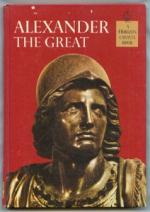|
This section contains 3,393 words (approx. 12 pages at 300 words per page) |

|
Overview
Alexander, a Macedonian king whose fourth-century B.C. military conquests earned him the name "Alexander the Great," united much of the known world of late antiquity into an empire. Alexander crushed Greek resistance, ended the Persian Empire, conquered Egypt, and invaded northern India. Thus, Alexander became the first to unite Europe and Asia Minor. Alexander's persona was both forceful and politically astute. His intelligent military strategy and worldly philosophies, along with striking physical features and both brutal and benevolent treatment of the vanquished, elevated Alexander to the status of a deity during his lifetime. During the reign of Alexander, the culture and language of Greece spread far throughout the empire, becoming the idealized standard for a new, united world. After Alexander's death, the common culture, referred to as Hellenistic, endured, even as Greece fought civil unrest and Alexander's generals battled for pieces of...
|
This section contains 3,393 words (approx. 12 pages at 300 words per page) |

|


